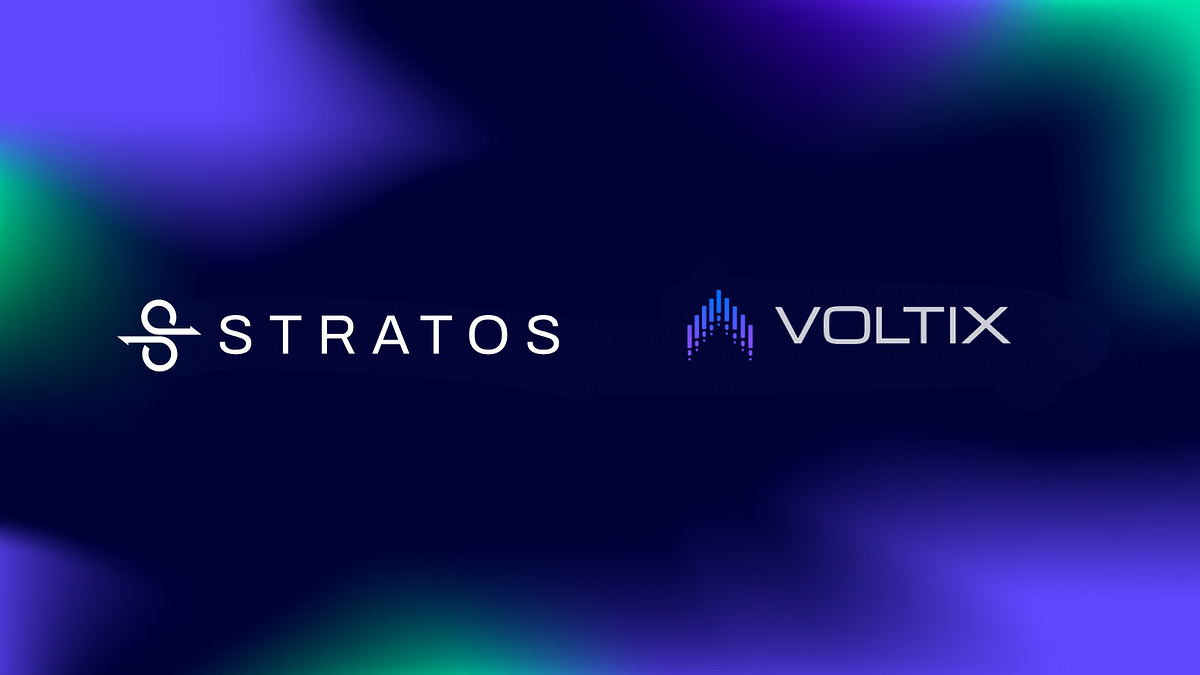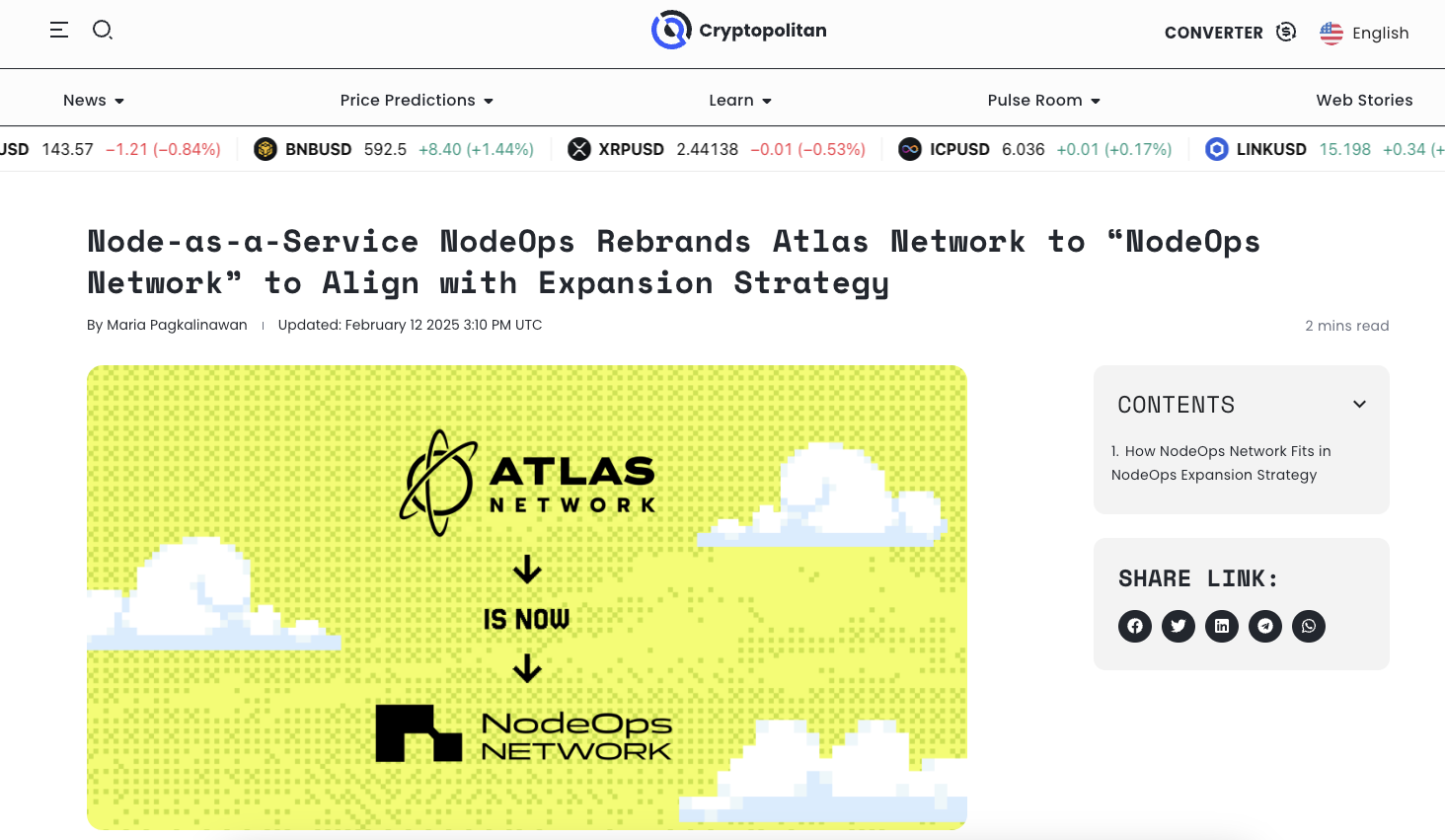Latest DePIN News

3 months ago
Streamr's Vision for 2025: A Decentralized Future
As we approach 2025, Streamr is set to undergo a significant transformation, evolving from a background infrastructure provider to an open platform for freedom technology applications. This shift aims to leverage the decentralized data network, allowing Streamr applications to coexist within a broader ecosystem that enhances network effects for all participants. The focus is on creating a community-owned network that prioritizes data sovereignty, offering a stark contrast to the monopolistic platforms that dominate the digital landscape today. Streamr envisions a future where freedom tech is not just a niche but a fundamental aspect of the free Internet, positioning itself as the nervous system of this new paradigm.
One of the standout features of Streamr's evolution is the introduction of StreamrTV, a pioneering consumer-facing web application that will enable users to broadcast live video through a fully decentralized data network. This initiative is set to launch in the first half of 2025 and represents a significant milestone in demonstrating the capabilities of decentralized freedom technology. Unlike traditional applications, Streamr apps will rely on the Streamr Network for their core functionalities, emphasizing real-time communication and live streaming as foundational elements. This approach not only showcases the potential of decentralized applications but also aims to provide seamless, real-world experiences for users.
The role of the DATA token is also evolving within the Streamr ecosystem, serving as a utility token that powers decentralized data streaming and project governance. Users can stake DATA to discover content, access premium features, and contribute to network effects while earning tokens in the process. This dual approach to value capture at both the protocol and application levels ensures that incentives are aligned among node operators, developers, and the broader community. As Streamr prepares for a year of bold moves and ambitious goals, it invites everyone to participate in shaping the future of decentralized streaming, highlighting the importance of community engagement in this transformative journey.

3 months ago
Decentralizing Infrastructure: The Rise of DePINs
Decentralized Physical Infrastructure Networks (DePINs) are revolutionizing the management of both digital and physical infrastructure by enabling individuals to contribute and monetize various resources, such as wireless coverage, mapping data, GPS positioning, and IoT device data. This innovative approach leverages blockchain technology and cryptoeconomic incentives, allowing participants to earn rewards for their contributions. The article highlights four key projects within the DePIN space: Helium, Hivemapper, GEODNET, and AYDO, each focusing on different aspects of decentralized infrastructure, including wireless communication, mapping, positioning, and IoT data-sharing.
While all these projects share the DePIN framework, their participation models and hardware requirements vary significantly. Helium allows users to deploy hotspots for decentralized wireless networks, while Hivemapper incentivizes the installation of dashcams for real-time mapping data. GEODNET enhances GPS accuracy through rooftop satellite miners, and AYDO stands out by enabling users to connect existing IoT devices to blockchain networks without the need for proprietary hardware. This flexibility positions AYDO as a unique player in the DePIN landscape, catering to a broader audience by supporting widely used IoT protocols.
Despite the promise of DePINs, several challenges remain. Issues such as hardware accessibility, market demand for data, security, and regulatory uncertainty could hinder the widespread adoption of these models. The success of IoT-focused DePINs will depend on their ability to ensure interoperability, economic sustainability, and compliance with privacy regulations. As the DePIN ecosystem continues to evolve, it is evident that different models may cater to various sectors, offering a compelling alternative to traditional corporate-controlled infrastructure, while empowering individuals with greater control over their contributions and rewards.

3 months ago
Litecoin, Jito, and Bittensor Experience Significant Price Rallies Amid Market Recovery
In the past week, Litecoin (LTC), Jito (JTO), and Bittensor (TAO) have experienced significant price rallies, with gains ranging from 17% to 22%, according to CoinGecko data. This upward momentum can be attributed to Bitcoin's resilience amid various macroeconomic factors, including the U.S. Consumer Price Index (CPI) and tariff announcements. As Bitcoin continues to stabilize, altcoins like LTC, JTO, and TAO are also benefiting from this market-wide recovery, with LTC gaining 2.53%, JTO increasing by 5.68%, and TAO rising by 2.98% on the same day, as reported by TradingView.
On-chain analysis from Santiment reveals that Litecoin's total open interest has surged to $416.87 million, indicating increased trader activity. Similarly, Jito has seen a rise in social dominance and trade volume, reflecting heightened interest from both institutional and retail traders. Meanwhile, Bittensor's trading volume has remained steady, although recent data suggests a bearish sentiment among derivatives traders. The technical indicators for LTC, JTO, and TAO all point towards potential further gains, with LTC aiming to retest its 2025 peak, while JTO and TAO also have key resistance levels to watch.
Market sentiment has been bolstered by speculation around potential ETF approvals, particularly for Litecoin, which is seen as having a 90% chance of approval according to Bloomberg's Eric Balchunas. This anticipation has been a significant driver for LTC's recent performance. Additionally, the upcoming Dynamic TAO update, likened to Ethereum's Merge, has generated excitement within the Bittensor community, further contributing to its price rally. As the crypto market continues to evolve, these developments highlight the dynamic nature of altcoin trading and the factors influencing investor sentiment.

3 months ago
Plurality Network Launches Decentralized User-Owned Smart Profiles for Web3
In the evolving landscape of Web3, Plurality Network is pioneering a decentralized, user-owned profile system that addresses the pressing issues of data ownership and interoperability. As users navigate multiple platforms, they generate vast amounts of data, yet they lack control over this information. Traditional Web3 applications primarily focus on financial transactions, leaving a gap in user-centric applications. Plurality Network aims to bridge this gap by creating Smart Profiles, which are rich, chain-agnostic profiles linked to a user’s wallet. These profiles aggregate data from both Web2 and Web3 sources, ensuring that users have a say in how their data is utilized and shared.
The Smart Profiles are powered by advanced technologies, including an AI agent that personalizes user experiences based on the aggregated data. Plurality Network offers developers a suite of tools designed to enhance user engagement and retention. Key features include embedded wallets that simplify account creation through social logins, a Profile SDK that allows applications to store and utilize user data effectively, and on-chain data proofs that enable verifiable interactions with smart contracts. This innovative approach not only enhances user experience but also fosters a more personalized interaction with decentralized applications (dApps).
By leveraging these tools, Plurality Network is set to transform the user experience in Web3, making it more frictionless and engaging. Developers interested in enhancing their applications can join Plurality Network’s Partner Program to access free credits and additional resources. As the Web3 ecosystem continues to grow, initiatives like Plurality Network's Smart Profiles will be crucial in creating lasting connections between users and applications, ultimately driving the next wave of innovation in the decentralized space.

3 months ago
Stratos Partners with Voltix AI to Revolutionize Decentralized Computing
Stratos has announced an exciting partnership with Voltix AI, a cutting-edge decentralized computing platform, aimed at enhancing AI training, high-performance computing (HPC), and Web3 applications. As the demand for AI computing power and decentralized data storage continues to soar, traditional cloud providers are often seen as expensive and centralized, leading to potential bottlenecks. This collaboration seeks to dismantle these barriers by offering a trustless, distributed, and incentive-driven ecosystem that supports developers, businesses, and Web3 applications alike.
Voltix AI optimizes AI and HPC by utilizing idle CPU power, while Stratos complements this by providing secure and high-performance storage solutions. The fully decentralized nature of this partnership eliminates central points of failure, ensuring both scalability and reliability for users. Additionally, the incentivized ecosystem is a key feature, where Stratos rewards storage providers through its Proof-of-Traffic mechanism, and Voltix AI encourages contributions to computing resources. This innovative approach not only enhances performance but also fosters a collaborative environment for all participants.
Moreover, Stratos’ API facilitates seamless video streaming, enabling private and high-quality streaming for AI-driven content. By integrating decentralized storage, computing, and AI workloads, Stratos and Voltix AI are paving the way for a future where developers and enterprises can operate independently of traditional centralized cloud providers, ultimately leading to a more efficient and resilient technological landscape.

4 months ago
Teneo Protocol Secures $3 Million Funding to Democratize Social Media Data Access
Teneo Protocol, a decentralized protocol aimed at democratizing access to social media data, has successfully secured $3 million in seed funding. This funding round was led by notable venture capital firms RockawayX and Borderless, with additional participation from Generative Ventures and others. The investment will support Teneo's mission to transform the data economy by incentivizing users to unlock public social media data. With a growing global network of several million users, Teneo is poised to make significant strides in facilitating access to valuable data resources that are increasingly restricted by major social media platforms.
The challenge of accessing social media data has intensified as platforms like Reddit begin to charge businesses for data access, creating barriers that could stifle innovation in artificial intelligence (AI) and other sectors. Teneo aims to address this issue through its Community Node, a Web3 browser extension that allows users to collect public posts from platforms such as X (formerly Twitter) and Reddit. Users are rewarded with Teneo Points for their contributions, which can later be converted into Teneo Tokens once the network's native token is launched. This initiative not only enhances data accessibility but also opens new avenues for industries that rely on real-time social data, including AI, finance, and marketing.
The Teneo Community Node has already gained traction, boasting over 3.9 million users across 191 countries, with more than 1.1 million users connecting their digital wallets to the platform. Investors express enthusiasm for Teneo's potential to reshape the data landscape, emphasizing the importance of decentralized solutions in the evolving data economy. As Teneo continues to develop its platform, it aims to empower individuals by returning data ownership to the people, fostering a community-driven approach to data utilization and innovation in the digital age.

4 months ago
CUDOS Intercloud Unveils New Design and Referral Program
CUDOS Intercloud has recently undergone a significant transformation, unveiling a sleek new design that enhances both functionality and user experience within its decentralized compute marketplace. This update aims to make the platform faster and more intuitive, aligning with CUDOS's mission to democratize cloud computing. Key improvements include a refreshed interface that maintains an efficient layout, easy access to information through tabs and documentation links, and notable roadmap progress, including the completion of MetaMask support and multi-chain compatibility. Future enhancements will focus on cross-chain functionality and smart contracts, further enriching the user experience.
In addition to the platform's redesign, CUDOS Intercloud has launched a new referral program that incentivizes users to share the platform with others. By generating a unique referral link, users can earn commissions for every new user who joins and utilizes the services. The referral program offers typical commission rates of 1% to 1.5% per transaction, allowing users to benefit from their network. This initiative not only encourages community engagement but also rewards users for contributing to the platform's growth.
The referral program is now live, with users able to generate their unique links directly from the Intercloud website. Commissions are paid out in FET (Cosmos) and are processed instantly, with a minimum withdrawal amount set at $15. Users who earn over $15,000 will need to complete a manual KYC check before making further withdrawals. CUDOS Intercloud invites both new and existing users to explore the updated platform and participate in the referral program, fostering a collaborative environment for the community to thrive.

4 months ago
Atlas Network Rebrands To NodeOps Network
https://www.cryptopolitan.com/node-as-a-service-nodeops-rebrands-atlas-network-to-nodeops-network-to-align-with-expansion-strategy/

4 months ago
NodeOps Network is ranked 4th Globally in DePIN Sector
https://crypto.news/nodeops-ranks-4th-in-depin-revenue-amid-platform-rebrand/
Signup for latest DePIN news and updates
